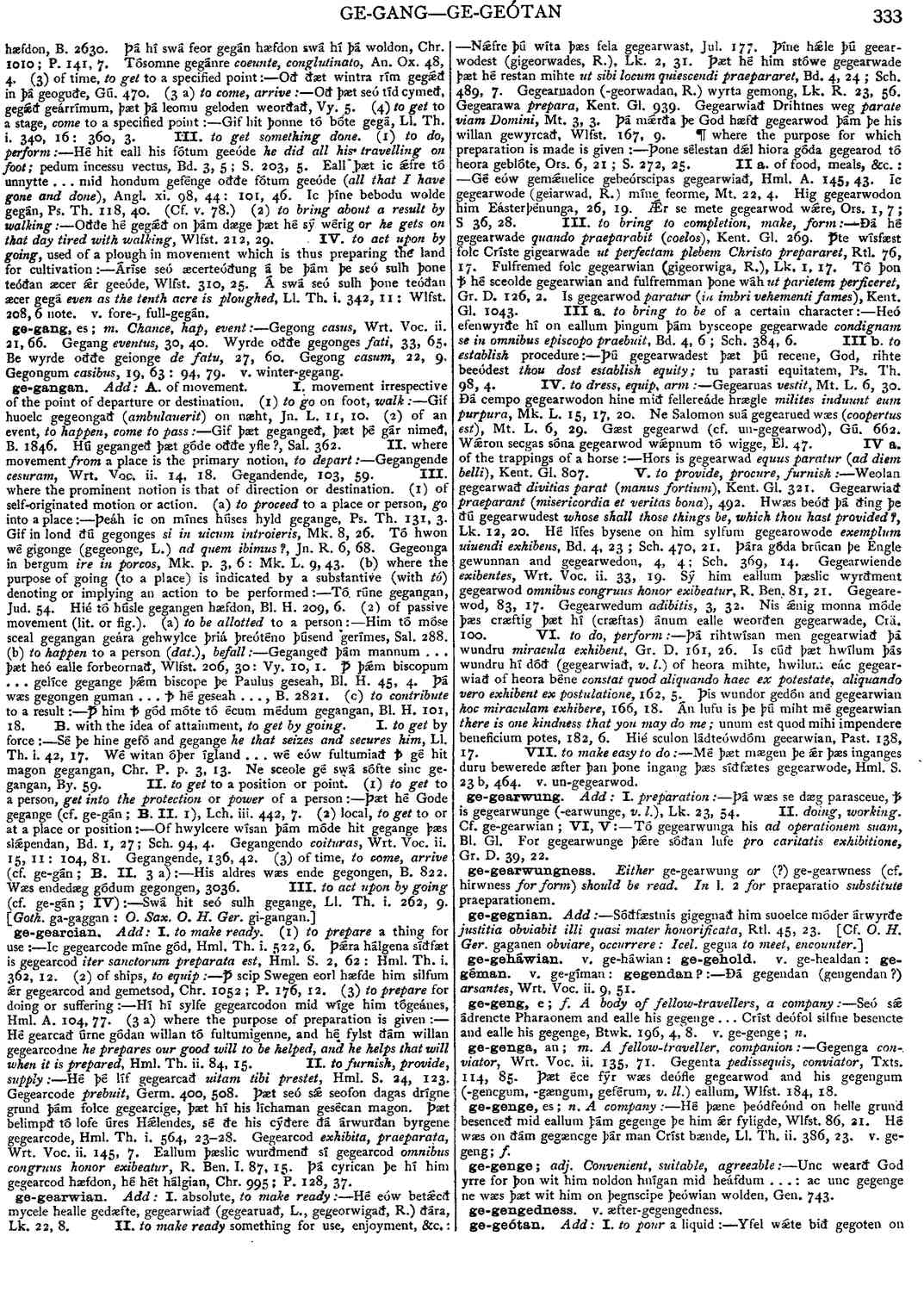ge-gangan
-
Gif huoelc gegeongað (
ambulauerit
) on næht,- Jn. L. 11, 10.
-
Gif þæt gegangeð, þæt þé gár nimeð,
- B. 1846.
-
Hú gegangeð þæt góde oððe yfle?,
- Sal. 362.
-
Gegangende
cesuram,
- Wrt. Voc. ii. 14, 18.
-
Gegandende,
- 103, 59.
-
Þeáh ic on mínes húses hyld gegange,
- Ps. Th. 131, 3.
-
Gif in lond ðú gegonges
su in uicum introieris,
- Mk. 8, 26.
-
Tó hwon wé gigonge (gegeonge, L.)
ad quem ibimus?,
- Jn. R. 6, 68.
-
Gegeonga in bergum
ire in porcos,
- Mk. p. 3, 6: Mk. L. 9, 43.
-
Tó rúne gegangan,
- Jud. 54.
-
Hié tó húsle gegangen hæfdon,
- Bl. H. 209, 6.
-
Him tó móse sceal gegangan geára gehwylce þriá þreóténo þúsend gerímes,
- Sal. 288.
-
Gegangeð þám mannum . . . þæt heó ealle forbeornað,
- Wlfst. 206, 30: Vy. 10, 1.
-
Ꝥ þǽm biscopum . . . gelíce gegange þǽm biscope þe Paulus geseah,
- Bl. H. 45, 4.
-
Þá wæs gegongen guman . . . ꝥ hé geseah . . .,
- B. 2821.
-
Ꝥ him ꝥ gód móte tó écum médum gegangan,
- Bl. H. 101, 18.
- B. with the idea of attainment, to get by going.
-
Sé þe hine gefó and gegange
he that seizes and secures him,
- Ll. Th. i. 42, 17.
-
Wé witan óþer ígland . . . wé eów fultumiað ꝥ gé hit magon gegangan,
- Chr. P. p. 3, 13.
-
Ne sceole gé swá sófte sinc gegangan,
- By. 59.
-
Þæt hé Gode gegange (cf. ge-gán; B. II. 1),
- Lch. iii. 442, 7.
-
Of hwylcere wísan þám móde hit gegange þæs slǽpendan,
- Bd. 1, 27; Sch. 94, 4.
-
Gegangendo
coituras,
- Wrt. Voc. ii. 15, 11: 104, 81.
-
Gegangende,
- 136, 42.
-
His aldres wæs ende gegongen,
- B. 822.
- Wæs endedæg gódum gegongen, 3036.
-
Swá hit seó sulh gegange,
- Ll. Th. i. 262, 9.
Bosworth, Joseph. “ge-gangan.” In An Anglo-Saxon Dictionary Online, edited by Thomas Northcote Toller, Christ Sean, and Ondřej Tichy. Prague: Faculty of Arts, Charles University, 2014. https://bosworthtoller.com/48100.
Checked: 0